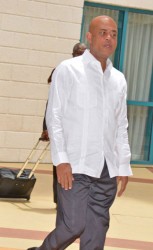Caricom Heads who met in Barbados from July 2 to 4 condemned the manner in which the Dominican Republic was treating Haitians who have been living and working there.
In their communique issued on July 5, the Heads voiced “abhorrence and outrage with respect to the treatment of Dominicans of Haitian descent and Haitian migrants in the Dominican Republic.” The Heads said that this human rights problem has been aggravated as the so-called voluntary repatriation gathers pace in “unregulated conditions resulting from pressures and the threat of violence as well as the absence of a revised bilateral framework between Haiti and the Dominican Republic that the latter has been unwilling to conclude.”
Relations between the regional grouping and the Dominican Republic – which shares the isle of Hispaniola with Caricom member, Haiti – have turned frosty in recent years over the denationalisation of Haitians born in Santo Domingo and now over the repatriation of Haitians.

The Heads said that their concerns have been heightened by the breach of the undertakings given by the representatives of the Dominican Republic during the High-Level Dialo-gue between the European Union and Cariforum in Brussels on 11 June 2015 that there would be a new approach on repatriation of Haitians. Caricom has had a series of meetings over the plight of Haitians in the Dominican Republic and the much criticised law which stripped Haitians born there of nationalisation.
The Heads in the communique “underlined the compelling importance of the Dominican Republic concluding with Haiti the often requested revision of the 1999 Protocol on repatriation to take into account the new realities on the ground and to establish an agreed framework. Such a mechanism would ensure an orderly repatriation process with predictability and in-built checks and balances to preclude mass deportations and prevent the expulsion of Dominicans of Haitian descent made stateless by the 2013 ruling on nationality of the Constitutional Court to a country which is not theirs.” The Heads said that a revised Protocol would also help the receiving state to better manage the growing influx.
The Heads denounced what they “perceive as the makings of a grave humanitarian crisis in the Region” and welcomed the statement of the United Nations Secretary-General Ban Ki-moon at the Opening Ceremony of the summit, underlining the importance of respect for human rights and dignity of the persons caught up in this deteriorating situation.
The Heads also welcomed the information provided by the Secretary-General of the Organisa-tion of American States that the OAS was arranging to inquire into the situation on the ground.





